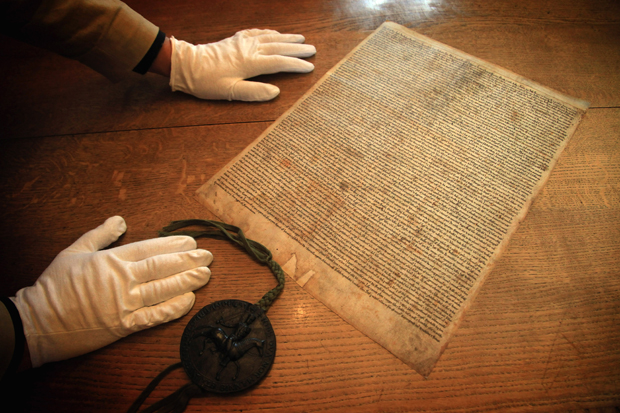We all know that next year’s centenary of Gallipoli is a big deal. But were you aware of another important milestone in 2015: the 800th anniversary of the Magna Carta, on 15 June? The peace treaty, which King John negotiated with his warring barons, may fail to evoke Anzac’s popular spirit, but its nation-forging impact is no less significant. Magna Carta, chief justice Gerard Brennan wrote in 1957, ‘is an incantation to the spirit of liberty… the talisman of a society in which tolerance and democracy reside… [It] continues to infuse the deepest aspirations of the Australian people.’
Just as we hope our successors will be still commemorating Anzac in 700 years’ time, our love and respect for the rule of law as the ultimate source of liberty emphasises the importance of celebrating this milestone. A second reason would be the opportunity to engage in spirited reflection on the nature of liberty in the 21st century. We live in a time where the personal opportunities for individual freedom — for better and for worse — have never been so great, nor has the potential for intrusive state power. Should there be any limits to free speech in the digital era? What harms to one’s neighbour should be fair game for the law in 2015? How do we deal with the ever encroaching impact of government? Are Assange and Snowden heroes or villains?
There is a third, less obvious, reason for reflection. In recent decades, much new light has been shed on English society of the 1100s and 1200s. Popular perception has been of a static, essentially feudal society. Consistent with this, many have sought to disparage the Magna Carta as reflecting no more than the greed of the English barons, largely an economic document with just two of its 63 clauses enjoying enduring significance to the evolution of legal rights — clause 39 (‘except by the lawful judgment of his peers’) and clause 40 (‘to no one will we deny or delay right or justice’). Neither, of course, is a bad start but to see it quite so narrowly misses the broader point.
Taken together, the 63 clauses of the 1215 version reflect a sophisticated and prosperous society, more similar to our own than we generally appreciate. Marriage, taxation and fines, the operation of the fledgling court system and debt collection are all covered. But it also deals with the freedom of international traders, a national system of measures, town creation, bridge building and the enclosure of forests and streams. In trying to understand better the significance of the Magna Carta as we approach 2015, this point about a sophisticated and prosperous society is critical. The fact is that the period leading to the Magna Carta was one of extraordinary change and innovation in England.
Consider the following: invention (the windmill, 1185), urbanisation (57 new towns between 1180 and 1230), education (Oxford 1167, including a school of business from the early 1200s, and Cambridge 1209), energy (the first coal to London, 1228), infrastructure (London Bridge completed in stone, 1208), currency (halfpennies and farthings, 1180), public and private record-keeping (hence continuous price, wage and monetary data from the early 1200s) and international trade (hence London’s ascension over Winchester as the primary place of government by the late 1100s). The popular ‘feudal’ conception may be a good description for Continental Europe, but almost certainly not for England. As one English writer of the day noted, ‘no one who wanted to make money need ever die poor’. London and the other rising towns proved magnets for commerce — there was legal and economic substance in the popular saying ‘town air makes you free’. That is the context for the Magna Carta.
Which brings me to Australia’s heritage. The fact that the barons at Runnymede were prepared to concede to King John on the basis of a legal document of rights, barely 50 years on from the very origins of the common law, tells us just how extraordinary the change had been. And the fact that the King had conceded that he was no longer above the law was truly revolutionary. Both the benefits and challenges of this freedom have never been more evident than they are now. We are the inheritors and beneficiaries of its legacy. So too are we the trustees. To honour our military heritage of Anzac — the hammer of our nation — will be a great excitement. Honouring our freedom heritage — the anvil of our nation — should be just as exciting.
Got something to add? Join the discussion and comment below.
Get 10 issues for just $10
Subscribe to The Spectator Australia today for the next 10 magazine issues, plus full online access, for just $10.
Hugh Harley is a partner at PwC.
You might disagree with half of it, but you’ll enjoy reading all of it. Try your first month for free, then just $2 a week for the remainder of your first year.














Comments
Don't miss out
Join the conversation with other Spectator Australia readers. Subscribe to leave a comment.
SUBSCRIBEAlready a subscriber? Log in